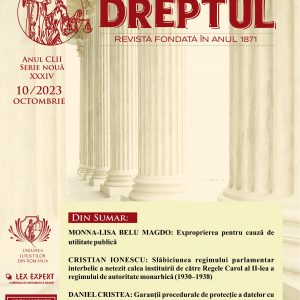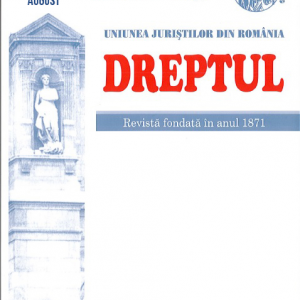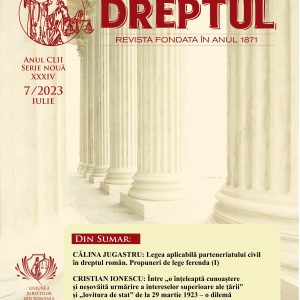-
 Taking into consideration the fact that the coverage of the World Trade Organization has been expanded to the field of services as well, in this study, the author examines litigations in the matter of services, which can be resolved by the mentioned Organization, with the observation that only countries or, as the case may be, the European Union, can be “parties” in such litigations. The implementation of the General Agreement on Trade in Services (GATS) between the countries is conditioned by the “influence” on the international trade in services by various actions taken by the Member States; in this respect, in the practice of GATS implementation, the notion of “influence” is understood extensively.
Taking into consideration the fact that the coverage of the World Trade Organization has been expanded to the field of services as well, in this study, the author examines litigations in the matter of services, which can be resolved by the mentioned Organization, with the observation that only countries or, as the case may be, the European Union, can be “parties” in such litigations. The implementation of the General Agreement on Trade in Services (GATS) between the countries is conditioned by the “influence” on the international trade in services by various actions taken by the Member States; in this respect, in the practice of GATS implementation, the notion of “influence” is understood extensively. -
 Departing from the constitutional basis underlying the relations between the Constitutional Court of Romania and the European Court of Human Rights, this study examines the judicial dialogue between the two courts and the effects thereof. The conclusion of this study, based on numerous examples from case-law, is that the dialogue between the constitutional judge and the European Judge serves to develop common standards for the protection of fundamental rights, as well as to enriching those existing at national level, with effects in terms of law-making and law-enforcement.
Departing from the constitutional basis underlying the relations between the Constitutional Court of Romania and the European Court of Human Rights, this study examines the judicial dialogue between the two courts and the effects thereof. The conclusion of this study, based on numerous examples from case-law, is that the dialogue between the constitutional judge and the European Judge serves to develop common standards for the protection of fundamental rights, as well as to enriching those existing at national level, with effects in terms of law-making and law-enforcement. -
 This study examines the issue of dialogue between the Court of Justice of the European Union and the constitutional courts of the Member States of the European Union, with special reference to the Constitutional Court of Romania, and from this perspective, the effects of integration into the European Union and the transnational judicial dialogue they produce within the national legal systems.
This study examines the issue of dialogue between the Court of Justice of the European Union and the constitutional courts of the Member States of the European Union, with special reference to the Constitutional Court of Romania, and from this perspective, the effects of integration into the European Union and the transnational judicial dialogue they produce within the national legal systems. -
 The development of the legal framework for public procurement in the European Union represents a very important issue which presents numerous challenges. The starting point of the evolution of legal aspects in public procurement was the year of 1962, when the institutions of the European Community at that time underlined the importance of the regulation of this aspect for making the common market operational. In this respect, they militated for eliminating commercial restrictions inside the Community among the member states by making operational the freedom to establish and the free movement of services. Originally, public procurement represented a non-tariff barrier in the development of the common market, thus opening the way toward the harmonization of this field by the European Commission among its member states, including Romania. The previously mentioned legislative process was divided by the doctrine of the public procurement law in 4 stages which describe the evolution of public contracts for goods, works and services.
The development of the legal framework for public procurement in the European Union represents a very important issue which presents numerous challenges. The starting point of the evolution of legal aspects in public procurement was the year of 1962, when the institutions of the European Community at that time underlined the importance of the regulation of this aspect for making the common market operational. In this respect, they militated for eliminating commercial restrictions inside the Community among the member states by making operational the freedom to establish and the free movement of services. Originally, public procurement represented a non-tariff barrier in the development of the common market, thus opening the way toward the harmonization of this field by the European Commission among its member states, including Romania. The previously mentioned legislative process was divided by the doctrine of the public procurement law in 4 stages which describe the evolution of public contracts for goods, works and services. -

-
 Potrivit art. 246 C.pen., fapta de a îndepărta, prin constrângere sau corupere, un participant de la o licitație publică ori înțelegerea între participanți pentru a denatura prețul de adjudecare se pedepsește cu închisoarea de la unu la 5 ani. Conform art. 244 alin. (1) C.pen., inducerea în eroare a unei persoane prin prezentarea ca adevărată a unei fapte mincinoase sau ca mincinoasă a unei fapte adevărate, în scopul de a obține pentru sine sau pentru altul un folos patrimonial injust și dacă s-a pricinuit o pagubă, se pedepsește cu închisoarea de la 6 luni la 3 ani. Articolul 25 alin. (3) C.pr.pen. prevede că instanța, chiar dacă nu există constituire de parte civilă, se pronunță cu privire la desființarea totală sau parțială a unui înscris sau la restabilirea situației anterioare săvârșirii infracțiunii (cu notă parțial aprobativă).
Potrivit art. 246 C.pen., fapta de a îndepărta, prin constrângere sau corupere, un participant de la o licitație publică ori înțelegerea între participanți pentru a denatura prețul de adjudecare se pedepsește cu închisoarea de la unu la 5 ani. Conform art. 244 alin. (1) C.pen., inducerea în eroare a unei persoane prin prezentarea ca adevărată a unei fapte mincinoase sau ca mincinoasă a unei fapte adevărate, în scopul de a obține pentru sine sau pentru altul un folos patrimonial injust și dacă s-a pricinuit o pagubă, se pedepsește cu închisoarea de la 6 luni la 3 ani. Articolul 25 alin. (3) C.pr.pen. prevede că instanța, chiar dacă nu există constituire de parte civilă, se pronunță cu privire la desființarea totală sau parțială a unui înscris sau la restabilirea situației anterioare săvârșirii infracțiunii (cu notă parțial aprobativă). -
 The author conducts a thorough analysis of the legal content regarding the crime of misappropriation of public tenders provided by art. 246 of the new Criminal Code, incrimination ex novo. With reference to the structure of this infringement, the object of criminal protection, the subjects, the objective and subjective aspect, the forms, modalities and sanctions provided by the law are examined in detail. Within the complementary explanations, the connections of the misappropriation of public tenders with other crimes and some procedural aspects are tackled with. Further, the legislative antecedents of this incrimination regulation, the solutions to be followed in case of occurrence of temporary situations and some elements of comparative law are presented. The author does not hesitate to express his opinion as regards the constitutional content of this criminal deed, its systematization and nature and to advance some of his own solutions and ideas related to this aspect. Towards the ending of this analysis several conclusions and proposals de lege ferenda are presented in order to determine an appropriate protection of the values and social relations concerned by this incrimination, an unitary enforcement of the text and implicitly a better performance of the criminal justice within Romania.
The author conducts a thorough analysis of the legal content regarding the crime of misappropriation of public tenders provided by art. 246 of the new Criminal Code, incrimination ex novo. With reference to the structure of this infringement, the object of criminal protection, the subjects, the objective and subjective aspect, the forms, modalities and sanctions provided by the law are examined in detail. Within the complementary explanations, the connections of the misappropriation of public tenders with other crimes and some procedural aspects are tackled with. Further, the legislative antecedents of this incrimination regulation, the solutions to be followed in case of occurrence of temporary situations and some elements of comparative law are presented. The author does not hesitate to express his opinion as regards the constitutional content of this criminal deed, its systematization and nature and to advance some of his own solutions and ideas related to this aspect. Towards the ending of this analysis several conclusions and proposals de lege ferenda are presented in order to determine an appropriate protection of the values and social relations concerned by this incrimination, an unitary enforcement of the text and implicitly a better performance of the criminal justice within Romania. -

-
 Within this study the authors intended to analyze the situations in which it can be promoted the action for damages by separate means under Article 19 (1) of the Law No 554/2004 on the administrative disputes and the moment of running of the one-year time limit within which this action can be promoted, having in view that the law does not establish precisely this moment, and the case-law offers various solutions adjusted to each case solved. Starting from these premises, the authors have proceeded, on the basis of the legal provisions in the matter and of the apparently non-unitary case-law solutions, to the systematization of the working hypotheses and to the elaboration of some objective criteria, legally substantiated, in order to determine the moment of running of this procedural time limit.
Within this study the authors intended to analyze the situations in which it can be promoted the action for damages by separate means under Article 19 (1) of the Law No 554/2004 on the administrative disputes and the moment of running of the one-year time limit within which this action can be promoted, having in view that the law does not establish precisely this moment, and the case-law offers various solutions adjusted to each case solved. Starting from these premises, the authors have proceeded, on the basis of the legal provisions in the matter and of the apparently non-unitary case-law solutions, to the systematization of the working hypotheses and to the elaboration of some objective criteria, legally substantiated, in order to determine the moment of running of this procedural time limit. -
 7 years after the entry into force of the new Civil Procedure Code, without claiming to make an exhaustive inventory of what could partially be called a failure of regulation and/or of application, the legal institutions and the judicial procedure with a new face, perhaps even revolutionary, or those only reformed and/or refurbished regulated by the new Civil Procedure Code have demonstrated successively or simultaneously their insufficiency or inefficiency, some being dysfunctional due to their own internal causes, others due to external causes referring, as a rule, to the absence of the adequate human, material and financial resources or simply as a result of the deformation by acclimatization by the courts, parties and participants in the civil trial, the examples being numerous. Under these circumstances, the necessity to regulate within the new Civil Procedure Code of a simplified court procedure results from the very materiality of the facts. The specificity of this simplified court procedure would be that it would imply to exclusively go through the written stage of the civil trial, possibly of a written stage more extensive than the current one regulated by Article 201 of the Civil Procedure Code, at the end of which the date of pronouncing the judgment will be established by administrative resolution. In this way, the duration for solving some cases with a medium or low complexity would be significantly shortened, by eliminating the time period between the date of completion of the written stage and the first trial term
7 years after the entry into force of the new Civil Procedure Code, without claiming to make an exhaustive inventory of what could partially be called a failure of regulation and/or of application, the legal institutions and the judicial procedure with a new face, perhaps even revolutionary, or those only reformed and/or refurbished regulated by the new Civil Procedure Code have demonstrated successively or simultaneously their insufficiency or inefficiency, some being dysfunctional due to their own internal causes, others due to external causes referring, as a rule, to the absence of the adequate human, material and financial resources or simply as a result of the deformation by acclimatization by the courts, parties and participants in the civil trial, the examples being numerous. Under these circumstances, the necessity to regulate within the new Civil Procedure Code of a simplified court procedure results from the very materiality of the facts. The specificity of this simplified court procedure would be that it would imply to exclusively go through the written stage of the civil trial, possibly of a written stage more extensive than the current one regulated by Article 201 of the Civil Procedure Code, at the end of which the date of pronouncing the judgment will be established by administrative resolution. In this way, the duration for solving some cases with a medium or low complexity would be significantly shortened, by eliminating the time period between the date of completion of the written stage and the first trial term -

-
 Although we are close to the tenth anniversary of the entry into force of the new Civil Code, the doctrine outlined around the institution of granting the benefit of family dwelling place at divorce has had reservations in providing solutions to some crucial issues for solving this type of applications. At the same time, the courts have frequently come up with contradictory solutions to these issues, however some guiding solutions can be distinguished. The main aspects on which we noted the existence of some divergences have concerned the admissibility by separate way, after the pronouncement of the divorce, of the application for the allocation of the dwelling that served as a family dwelling. Another hypothesis on which we will focus in the present study is that of possession of the dwelling place by the spouses on t he basis of other rights than those expressly raised for discussion in Article 324 of the Civil Code, such as the right of usufruct or the one arisen from the loan agreement. At the same time, we will try to offer several arguments based on which the courts could assign to the non-title holder spouse of the lease contract, under certain conditions, even the dwelling place with special rental regime initially allocated to the other spouse according to the criteria provided by the Law No 152/1998 1 , there being numerous discussions around this subject just before the entry into force of the current Civil Code. The debates behind these divergences are not only of interest to legal theorists, but have strong practical implications, the fate of the entire application depending on the solution offered, thus being essential to establish some stable and predictable rules, especially in a matter where safety should prevail, given the often vulnerable situation of the parties involved in the process. Therefore, the present study tries to offer some adequate solutions for the above-mentioned inconveniences, starting with the analysis of the criteria which the legislator has created for the allocation of the conjugal dwelling place, especially in the higher interest of the minor, following that, in the second part of the study, we would actually deal with the issues mentioned.
Although we are close to the tenth anniversary of the entry into force of the new Civil Code, the doctrine outlined around the institution of granting the benefit of family dwelling place at divorce has had reservations in providing solutions to some crucial issues for solving this type of applications. At the same time, the courts have frequently come up with contradictory solutions to these issues, however some guiding solutions can be distinguished. The main aspects on which we noted the existence of some divergences have concerned the admissibility by separate way, after the pronouncement of the divorce, of the application for the allocation of the dwelling that served as a family dwelling. Another hypothesis on which we will focus in the present study is that of possession of the dwelling place by the spouses on t he basis of other rights than those expressly raised for discussion in Article 324 of the Civil Code, such as the right of usufruct or the one arisen from the loan agreement. At the same time, we will try to offer several arguments based on which the courts could assign to the non-title holder spouse of the lease contract, under certain conditions, even the dwelling place with special rental regime initially allocated to the other spouse according to the criteria provided by the Law No 152/1998 1 , there being numerous discussions around this subject just before the entry into force of the current Civil Code. The debates behind these divergences are not only of interest to legal theorists, but have strong practical implications, the fate of the entire application depending on the solution offered, thus being essential to establish some stable and predictable rules, especially in a matter where safety should prevail, given the often vulnerable situation of the parties involved in the process. Therefore, the present study tries to offer some adequate solutions for the above-mentioned inconveniences, starting with the analysis of the criteria which the legislator has created for the allocation of the conjugal dwelling place, especially in the higher interest of the minor, following that, in the second part of the study, we would actually deal with the issues mentioned.
